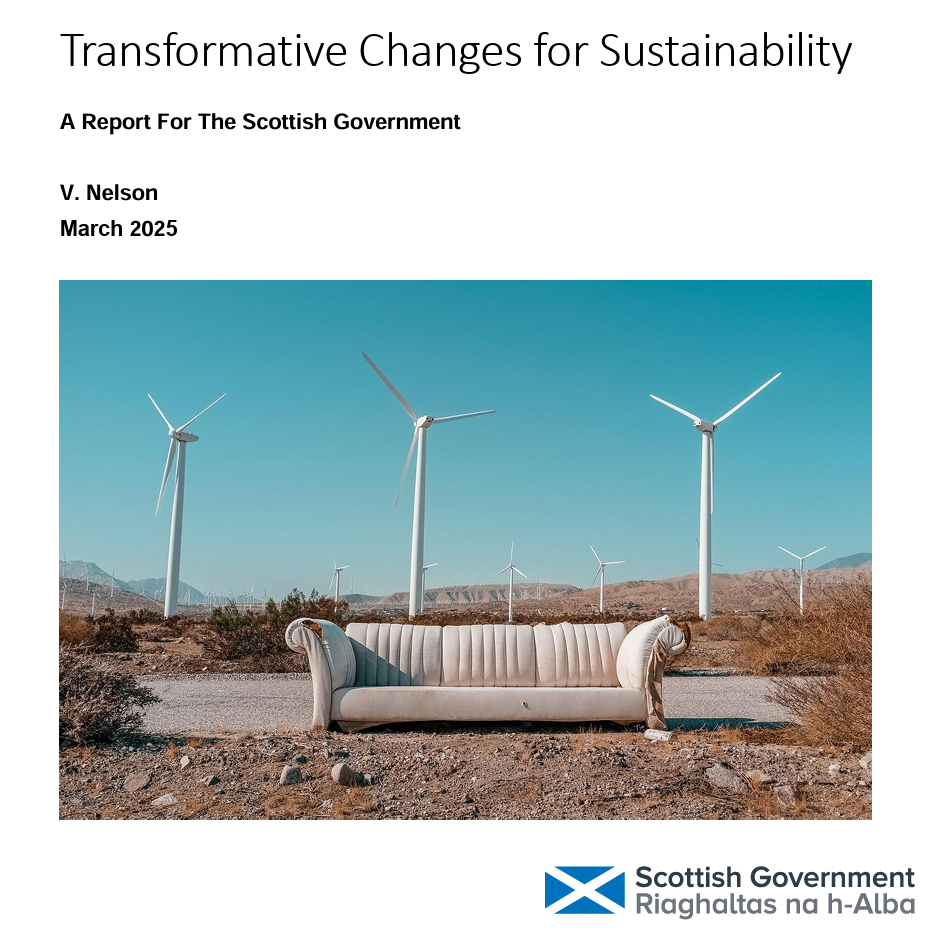
A recent report by NRI’s Professor Valerie Nelson is set to inform the Scottish government’s environment strategy – an overarching framework for Scotland’s strategies and plans for the environment and climate change. The report explores the scope for government action to shape policy decisions to drive more far-reaching, transformative change for sustainability.
A recent report by NRI's Professor Valerie Nelson is set to inform the Scottish government's environment strategy – an overarching framework for Scotland's strategies and plans for the environment and climate change. The report explores the scope for government action to shape policy decisions to drive more far-reaching, transformative change for sustainability.
The report explores the current academic and policy debates on and definitions of transformative change, which are vibrant, but also contested. The report examines the transformative potential of some of the policy levers originally identified and assessed in the 2022 Intergovernmental Panel on Biodiversity and Ecosystem Services (IPBES) Values Assessment. Drawing on more recent research evidence, Professor Nelson's analysis delves deeper into these levers and includes additional recommendations such as political levers. Some of the IPBES-identified 'more transformative potential' approaches are critically examined with changes suggested and new ones added. This approach enabled the formulation of comprehensive recommendations for governmental action aimed at driving transformations in Scotland and beyond.
The recommendations include process-focused approaches designed to foster critical debate about possible sustainability futures and deep policy shifts. This is crucial for advancing the kind of radical change that is now urgently needed. The urgency is highlighted by the limited action taken to date by many governments around the world, particularly those in high-income countries with historical and contemporary responsibilities for climate, ecological and social impacts. The report addresses both policies relating to Scottish ecologies and communities, but also Scotland's international impacts.
Pursuing and implementing transformative change is more crucial than ever given interconnected social and ecological challenges facing humanity and the escalating harm to ecosystems and communities. Yet, the concept of transformative change is understood in various ways – with critical social science, humanities and arts
perspectives having less traction in academic and policy discourse - which can complicate its achievement. Tensions are arising over responses to environmental challenges, where there is a perceived public perception of a lack of equity and justice. Despite the varied interpretations and such challenges, there can be opportunities for more transformative approaches to future sustainability.
The report outlines a broad set of potential sustainability leverage points, drawing on insights from recent transformation theory and practice. It emphasises the importance of deep leverage points that change values, over more superficial interventions which merely tweak current systems through focusing on market-based instruments and behavioural nudges to enable transformative change. The report underscores social movements' pivotal role in driving such change but also discusses practical ideas for government decision-makers.
Although sustainability transformations can feel like a receding possibility in the current global geo-political context, the report argues that real hope for effective long-term action lies in understanding and pursuing these deeper shifts. Climate and environmental impacts will also make changes increasingly necessary to the way we organise society.
The proposed leverage points cut across economic and fiscal policy levers, legal pathways, socio-cultural approaches, rights-based approaches and political dimensions, all aimed at driving meaningful change towards care-oriented outcomes. These outcomes prioritise values such as empathy, care, and relational responsibility in our interactions with nature, particularly the non-human components of our environment. They mark a shift away from purely economic or technocratic goals to more holistic, inclusive, and ethical dimensions of sustainability.

Proposed economic and financial measures include reimagining and redesigning economies towards commons-based, post-growth approaches that move beyond conventional models of progress. Legal strategies include exploring rights of nature in a national context and building community capacity to engage in speaking for non-humans, legal support for community land ownership and access. Socio-cultural strategies include embedding the environment across education and mobilising relationality and more-than-human insights in these education initiatives. They also comprise creating transdisciplinary learning spaces to explore sustainability futures, revitalising Indigenous Peoples' cultures, and learning from their knowledge and practices in Scotland. Rights-based approaches include investing in and supporting Indigenous Peoples' land rights. In the political sphere, recommendations range from expanding micro-deliberative democracy approaches, including non-human representation, protecting and expanding safe spaces for human rights and environmental defenders, and revitalising intergovernmental cooperation on sustainable futures.
Professor Nelson said the report is innovative, grounding its recommendations in critical social science and environmental humanities thinking, and interdisciplinary sustainability sciences, in a context where environmental policy is largely shaped by the natural sciences and economics. “There are important insights from relationality, More-than-human thinking and feminist thought that can and should be brought to bear on policy-making and other action for flourishing futures for all life. This report makes a small contribution in this regard, but I also hope that it sparks more discussion in UK environmental policy debates in the future.”
Read/download the full report on the Scottish Government website.

